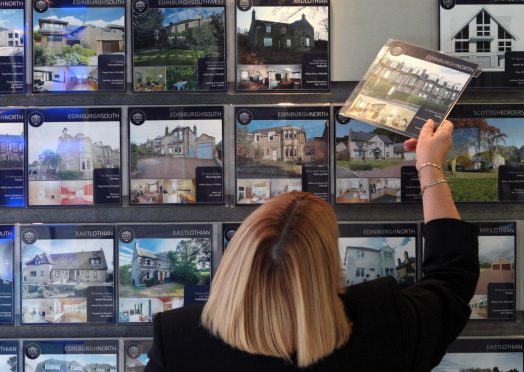When John Swinney first proposed his changes to stamp duty, home owners at the higher end of the market knew they were about to be clobbered.
Naturally, there was little sympathy for people who inhabited £1 million-plus properties, even when it became clear that the new Land and Buildings Transaction Tax (LBTT) would add £45,000 to the cost of their houses were they to sell.
But now there is plain evidence that this policy of wealth redistribution has backfired spectacularly, with housing sales stalling across the market following the introduction of the tax.
One in five Scots can’t afford to move, as the effects on the LBTT have created a bottleneck, with far fewer homes coming on to the market.
Sales of £1 million houses in Scotland fell by 35% compared to last year, according to the Bank of Scotland – in the rest of the UK, which has different stamp duty rates, the fall was just 1%.
The SNP claimed its LBTT would help more first-time buyers by taking homes of £145,000 and below out of the tax altogether. But the measure was not properly thought out and the results are proving devastating for anyone who aspires to move on – and up – in life. And that, surely, includes just about everyone.
Property has long been a means of acquiring wealth, as well as somewhere to live, and since Thatcher’s right to buy council house scheme of the ‘80s, climbing the property ladder has been regarded as an accessible route to progression for the upwardly mobile.
In his draft budget tomorrow, the Nationalists’ finance minister, Derek Mackay, is being urged to rethink the LBTT to try to get the market moving again. However, this is a government that prefers the dispossessed. It considers anyone earning more than £30,000 a year rich, and has drawn up plans to raise taxes for such higher earners.
In fact, those earning £24,000 could see their taxes increased, in proposals put forward by Nicola Sturgeon in November that would further widen the gap between taxpayers in Scotland and the rest of the UK.
Already, more than half a million Scots are paying extra income tax in 2017/18 compared to workers earning the same salary in England, and there are fears that the budget will inflict more pain on average Scottish families in the 2018/19 tax year.
The SNP’s ploy is to make even middle income earners contribute more to public services but it is a move business leaders warn will stifle growth. A survey on Monday revealed that 65% of small business owners believe an income tax rise will damage the economy. The Federation of Small Businesses has written to Mr Mackay to voice its concerns, and last week the Scottish Chambers of Commerce also cautioned against the SNP’s tactics.
In November, leading figures such as Sir Iain McMillan, former director of CBI Scotland, and Jack Perry, former chief executive of Scottish Enterprise, were among a group of business experts who said Scotland faced another recession if ordinary, hard-working people were used as the government’s “cash cows”.
Even the thinktank Reform Scotland, which backed the devolution of tax powers to Scotland, and the pro-independence group Business for Scotland have joined the mounting consensus against more tax rises.
It is to be hoped that the SNP at the very least listens to all this advice but the party that once liked to be seen as pro-business is, under Ms Sturgeon’s helm, driven by a more radical agenda, one that gives the First Minister a chance to parade her social conscience.
The Nationalist leader might regard herself as a modern-day Robin Hood but the ‘rich’ she is robbing make a modest living; they put in the hours and strive for better things but by this administration’s criteria they stand to be penalised.
And the business classes the SNP apparently despises are not particularly rich, either. Research showed that two thirds of those who run their own enterprises are basic rate taxpayers, earning between £11,501 and £43,000. Only 1.6% earn over £150,000. But to the Scottish Nationalists, Scots who start a business, buy a bigger home, get a pay rise or do anything that improves their lot are seen as fair targets, to be fleeced to fund the public purse.
The problem, Ms Sturgeon and her ministers are discovering, is that far from being a privileged echelon, this demographic most under attack constitutes the bulk of Scotland’s electorate.
That would explain why, after a decade in power, the SNP has disappointed so many voters, with some 500,000 at the last election turning away from the Nationalists.
While it might be too late to save the party, a dramatic change in fiscal strategy tomorrow could still rescue Scotland.
